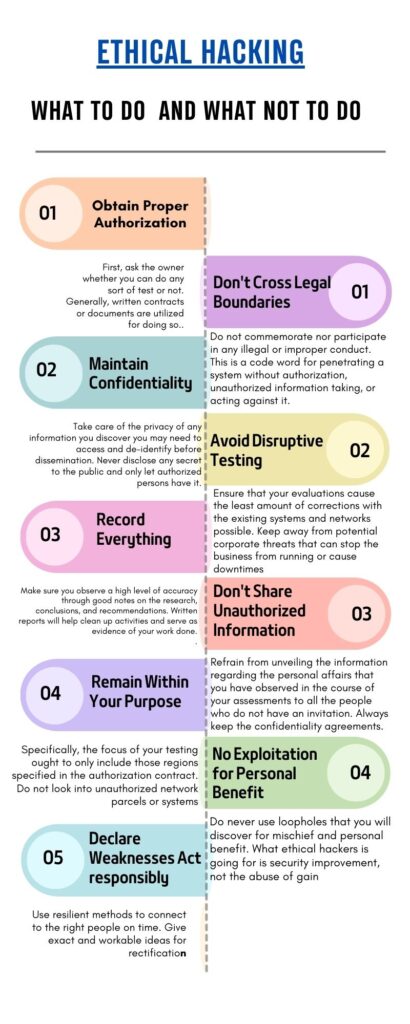admin
- Posted on
- No Comments
People usually connect the term “hacking” with the criminal act of entering computer systems or networks to steal data privately, disrupt service, or use it for extortion purposes. For experts, the world of hackers is a gloomy, terrifying, and bewildering place flooded with criminality, corporate spying, and state-sponsored cyberattacks from rogue nations.
Therefore, as hacking is still considered a bad thing in general, what is ethical hacking, and is it a good career choice for someone who wishes to get involved in cybersecurity?

In this article, we will investigate the reality of ethical hacking and decide if it is a good option for a career or not.
Hacking vs Ethical Hacking
In today’s technologically advanced world, the terms “hacking” and “ethical hacking” are frequently used as synonyms, but they are very different activities. Understanding this differential is pivotal since it not only shapes the cybersecurity perception itself but also provides ethical and legal boundaries for digital forensics.
What is Hacking?
Gaining unauthorized access to computer systems, networks, and devices is known as hacking. Hackers, who are mostly portrayed as the bad guys, use vulnerabilities in hardware and software to contaminate the data, gain access without rights, or perform other malicious activities. Among the most serious consequences of cybercrime are data theft, identity fraud, and system sabotage.
With time, the very word “hacker” got distorted and designated other meanings, such as “black hat” hackers those who use systems unlawfully or for personal gain, and “grey hat” hackers, those who act in a way that blurs the boundaries between right and wrong.
What is Ethical Hacking?
The legally performed computer system checking, network, and software with the purpose of the security mistake finding and fixing is called ethical hacking in other words. Ethical hacking is also known as white hat hacking. Ethical hackers who use their technology skills to assess and enhance a company’s defense system against possible cyberattacks are examples of such.
Ethical hackers stick to the moral and legal calling, and before conducting a security feasibility test, they always get a faulty system owner’s permission. The main aim of ethical hacking for improving cybersecurity by actively seeking out and destroying vulnerabilities before bad actors could exploit them lies in the fact that ethical hacking is a way.
Differences between Hacking and Ethical Hacking
| Intent |
Hacking is about unauthorized access to systems to cause harm or for personal benefit |
Ethical hacking, on the other hand, is done with consent and it aims to improve the security measures of systems |
| Legality | Hacking is illegal and attracts dire legal consequences including fines and imprisonment. | A moral hacker observes the laws and acts accordingly following the procedures and obtaining authorization. |
| Impact | Financial loss, reputational damage, and compromised data security are among the severe results of hacking | An appropriate ethical hacking can help avoid these situations by uncovering weaknesses and implementing prevention methods |
Who Can Be an Ethical Hacker?
Let us look into the eligibility one needs to have, to become an ethical hacker:
Technical Proficiency:
-
- Educational qualifications in computer science, information technology, or related intellectual skills must be possessed by ethical hackers. Becoming competent in scripting languages such as PowerShell or Bash and programming languages such as Python, Java, and C/C++ are highly recommended.
-
- Comprehending network protocols and operating system basics that are part of Windows, Linux, macOS, and many others is at the core of understanding the system weaknesses and exasperating the security assessment by employing optimum tools and tactics.
Cybersecurity Knowledge:
-
- It is necessary to be a master in cybersecurity frameworks, concepts, and principles of cyber. This is about being experienced in the use of intrusion prevention systems like firewalls, encryption programs such as VPNs, authentication mechanisms, and good security practices.
-
- A hacker with the qualification of knowing how cyberattacks are carried out, malware, and cyberthreats that are commonly present, can detect and prevent potential security breaches.
Ethical Mindset:
-
- For an ethical hacker, honesty and moral values, are never-disregardable aspects. They are constantly subject to such legal requirements; therefore, they must observe the law, protect privacy rights, and comply with ethical standards.
-
- High moral awareness and responsibility are important requirements for professional ethical hackers, who should also understand the possible consequences of their activities on system security and integrity.
Continuous Learning:
-
- With the appearance of more dangers and the speed with which technologies outpace each other, the cybersecurity landscape is forever changing. Ethical hackers, as a responsible group, have to constantly stay informed on the new methods, equipment, and trends in the market, which means they need to invest in their lifelong learning and professional development.
-
- Acquiring and apprehending certifications like CompTIA Security+, OSCP, or Certified Ethical Hacker (CEH) certifies the proficiency and the knowledge base in ethical hacking and displays an inclination and desire to do things excellently.
Problem-Solving Ability:
-
- Searching for vulnerability flaws and finding ways to strengthen the security system, ethical hackers bump into many riddles and hard issues. Complicated system analysis and problem-solving skills as well as the ability to break down tough systems, find holes in them, and think through practical outcomes, are very important.
Why should you become an Ethical Hacker?
Working as an Ethical Hacker is a big choice which has a lot of benefits and is very important in our ever-changing digital world
Protecting Digital Assets:
Your profession entails the big task of shielding digital assets from malicious risks. You contribute to securing data that is private, intellectual property, and infrastructure from cyberattacks, data breaches, and any other types of exploitation by proactively identifying and eliminating weaknesses in a security system.
Improving Cyber Security Process :
Ethical hackers aid businesses repeatedly in improving their cyber resilience. Performing a penetration test, vulnerability assessment, and security analysis assists in uncovering the system and network flaws and takes appropriate measures beforehand to raise security and minimise risks.
Mitigating Financial Losses:
Data breaches, operational disruptions, and fines from regulatory bodies can have expensive financial consequences for firms. Ethical hackers can help mitigate financial risks and ensure the profitability of organizations by detecting and rectifying weaknesses before evil actors get a chance to attack them.
Defending the Right to Privacy:
People’s privacy rights should be considered while digitalization is getting wider and wider. Honest hackers are required by digital system developers to assure the security and privacy of sensitive or private data that those systems keep. Through the process of tracking down and correcting security breaches, you take part in safeguarding the right to privacy and in protecting confidence in e-commerce.
Contributing to Global Security:
Ethical hacking touches several national and international security matters beyond the scope of specific organizations. Ethical hackers defend world peace and security by securing country networks, strengthening significant infrastructure, and anchoring on cyber attacks on a wider scale.
Promoting Creativity and Cooperation:
Today cybersecurity ethics demands the spirit of collaboration and creativity in ethical hacking. Using their knowledge and skills ethical hackers help others to tighten their security and move to a higher level of common learning which is a result of sharing their knowledge, methodology, and the best practices. The production of innovation and secure cyber-solutions arises when there is a collaborative relationship between security researchers, industry players, and ethical hackers.
Opportunities for job progression:
There are many options for someone who chooses ethical hacking as career growth. Ethical hackers, as a result of the rise of cybersecurity expertise, receive employment opportunities in many industries, for instance, technology, banking, healthcare, and government. Not only does this field offer quality jobs and much-appreciated variety, but ethical hacking also unlocks the doors for lifelong education and career advancement.
What to Do and What Not to Do in Ethical Hacking
Sure, here are some guidelines for ethical hackers, broken down into what to do and what not to do

NetCom Academy Kerala is a unique institute that helps students turn hacking ethically into a career opportunity. Through intensive courses and practical training, students will be able to acquire not only theoretical knowledge but also skills, which are in high demand in the field of cybersecurity. The academy having real-life circumstances and adhering to industry best practices assures that the graduates of the academy are equipped to overcome the challenge, which is the current state of the cyber world.
Besides the fact that gaining ethical hacking skills by joining NetCom Academy Kerala helps to open up a wide range of career opportunities, there are many sectors, like government departments, financial institutions, health care institutions, and internet companies, that hire ethical hackers on a large scale. Connect with us to learn more.




